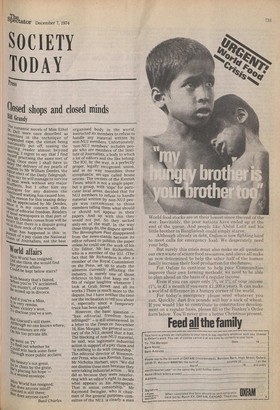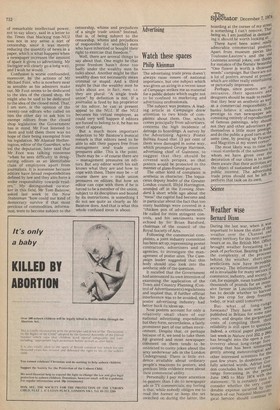Press
Closed shops and closed minds
Bill Grundy
Pe romantic novels of Miss Ethel Dell were once described as rcises in the technique of Pended rape, the climax being e°ntinually put off, teasing the L.Pantin
s. reader almost beyond
r„711ng. I regret to say that I find Zlf practising the same sort of Ing. Once more I shall have to _ aY the delivery of my pearls of nom to Mr William Deedes, the tor-elect of the Daily Telegraph. 'ti°11,are say he will manage to survive ill' next week without any major e,ffects, but I offer him my Nseologies for any distress the ltinued waiting has caused him. _, he reason for this teasing delay 811) be appreciated by Mr Deedes, %lee it is my concern with the of iSe of editorial freedom. Readers
ocal newspapers in that part of Mr Deedes comes from will be
a. re that there is a dispute going
their neck of the woods.
,wfiat has happened , is this: in '6uit of a pay claim the National 'ticin of Journalists, not the best organised body in the world, instructed its members to refuse to handle any material written by non-NUJ members. Unfortunately, `non-NUJ members' includes people who are members of the Institute of Journalists, a body to which a lot of editors and the like belong. The I0J, by the way, is a perfectly proper, legally recognised, union, and in no way resembles those sycophantic set-ups called house unions. The owners of the Kentish Times, which is not a single paper, but a group, with 'slips' for particular local areas, decided that for NUJ members to refuse to handle material written by non-NUJ people was tantamount to those members telling them what should or should not appear in their papers. And up with this they would not put. So they sacked sixty-six of the staff. In the way these things do, the dispute spread. The Birmingham Post disappeared from the news-stands because its editor refused to publish the paper unless he could use the work of his City Editor, Mr Ian Richardson, who is a member of the I0J. (The fact that Mr Richardson is also a member of the Royal Commission on the Press, set up to study the ailments currently afflicting the industry, is merely one of those delicious tit-bits that keep me in fits of vulgar laughter whenever I look at Grub Street and all its works.) There is much more to the dispute, but I have neither the time nor the inclination to tell you about it, especially since a temporary truce has been signed.
However, the basic question "has editorial freedom been infringed?" is still unanswered. In a letter to the Times on November 16, Ken Morgan, the general secretary of the NUJ, denied that it has. The blacking of non-NUJ material, he said, was legitimate industrial action in support of a pay claim and "is nothing to do with censorship." The editorial director of Westminster Press, who own Kentish Times, Mr Nicholas Herbert, says "We did not dismiss these men because they were taking industrial action ... We did so because they were interferring with an editor's right to decide what appears in his newspaper. That is union censorship.Mr Raymond Swingler, who is chairman of the general purposes committee of the NUJ, is clearly a man
of remarkable intellectual power, not to say idiocy, said in a letter to the Times that blacking non-NUJ was not in any sense a sort of censorship, since it was merely reducing the quantity of news in a paper, which is what happens when a newspaper increases the amount of space it gives to advertising. Mr Swingler will clearly go a long way, and I wish he would.
Confusion is worse confounded, moreover, by the actions of Mr Michael Foot, who is nowhere near as sensible as his admirers make out. Mr Foot seems to be dedicated to the idea of the closed shop. He might also be said to be dedicated to the idea of the closed mind. That, I am sure, is the opinion of the twenty-one editors who called on him the other day to ask him to exempt editors from the closed shop legislation the Government has in mind. Mr Foot listened to them and told them there was no hope of their being exempted from his legislation. Mr Alastair Hetherington, editor of the Guardian, who led the deputation, later said that Mr Foot was talking nonsense "when he sees difficulty in designating editors as an identifiable class of employees apart from journalists. It is nonsense because editors have broad responsibilities defined by law and they also have a wider responsibility towards readers.My distinguished co-worker in this field, Mr Tom Baistow, asked last week in the New Statesman ''how could our kind of democracy survive if that most precibus of commodities, information, were to become subject to the
censorship, whims and prejudices of a single trade union? Instead, that is, of being subject to the censorship, whims and prejudices of responsible (i.e. wealthy) men who have inherited or bought their right to exercise that freedom."
Well, there are several things to say about that. One might be that press freedom hasn't done too badly under the wealthy men he talks about. Another might be that wealthy does not necessarily mean criminal or stupid. And a third might be that the wealthy men he talks about are, in fact, men, i.e. they are plural: "A single trade union" by definition is not. If a journalist is fired by his proprietor or his editor, he can at present appeal to the NUJ. If the NUJ becomes his virtual employer, as could very well happen if editors are forced to belong to it, he has no court of appeal.
But a much more important objection to Mr Baistow's ironical remark is that editors need to be able to edit their papers free from management and trade union pressures alike. This is the point. There may be — of course there are — management pressures on editors. But any editor worth his salt knows what they are and how to cope with them. There may be — of course there are — trade union pressures on editors. But how an editor can cope with them if he is forced to be a member of the union, subject to its disciplines and bound by its instructions, is something I do not see quite as clearly as Mr Baistow does. And that is what this whole confused mess is about.



































 Previous page
Previous page